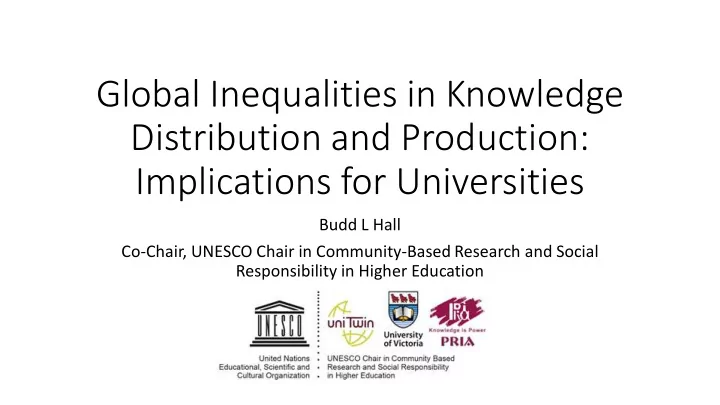

Global Inequalities in Knowledge Distribution and Production: Implications for Universities Budd L Hall Co-Chair, UNESCO Chair in Community-Based Research and Social Responsibility in Higher Education
Overview ew Global knowledge inequalities How to account for these inequalities? What can be done?-buzz groups Opportunities for the Association of Commonwealth Universities? (Group generating ideas)
Global Production of Academic Knowledge
Top 25 social science publications cited in Google Scholar
Science Papers published - 2016
Nobel Prize Laureates 1901-2018
ISI articles per million capita
Inequality of knowledge production
What accounts for these inequalities? • A history of epistemicide (de sousa santos) • Role of ranking systems • Availability of research funding • Differential work loads • Market priced academic publications • Language vulnerabilities
Epistemicide • Four epistemicides of the 16 th Century (Grosfoguel) • Indigenous ways of knowing (Canada) • African Indigenous knowledge (Wangoola and Odara-Hopper)
Role of university ranking systems • Drives all universities towards Western (English languages) and unattainable models • Contributes to the decline of journals in languages of the global South (except China) • Contributes to a colonising knowledge culture • Negatively impacts applied, public, arts-based and other creative forms of knowledge sharing
Uneven availability of research funding • State supported research granting councils have grown significantly in the OECD nation states • Africa, Latin America, many countries in Asia have very modest if any national sources for research funding • International funding such as the Grand Challenges Funds in the UK and other similar sources in the global North for the most part require Pis from the UK or other richer nations
Differential academic work loads/salaries • Salaries are much lower in all universities of the global South • Many academics take on other jobs to make ends meet • In addition they teach on average many more hours/week than do academics particularly in the research intensive universities • Funding that they may get is nearly always linked to partnerships with universities in the global North where the theme of the work is dictated by the Northern researcher
Impact of market priced knowledge distribution • The market based academic publishing industry promotes a model that exploits all academic labour even as it prices books, journals and other materials out of the hands of the vast majority of scholars in the global South let alone students. • The web of control of academic knowledge grows tighter and more monopolistic by the month (Leslie Chan) • National/local publishers are being forced out of the picture
Vitality of the World’s Languages
Franz Fanon - 1962 • “my friends, the European game is definitely over…if we want to see humanity advance, for Africa and for the world, we need to invent and discover a new way of thinking”
Boaventura de Sousa Santos • “There will be no global social justice without global epistemic justice”
What c can n be d done ne? • With one or two persons near you discuss some ideas on what might be done to reduce inequalities – 7-8 minutes
Feed-back – Share 3-4 stories
Cou ould ld the A e ACU play a a rol ole?
In your same groups of 3-4 persons • Brainstorm some ways that a global network such as the ACU might contribute to democratising knowledge distribution
Recommend
More recommend